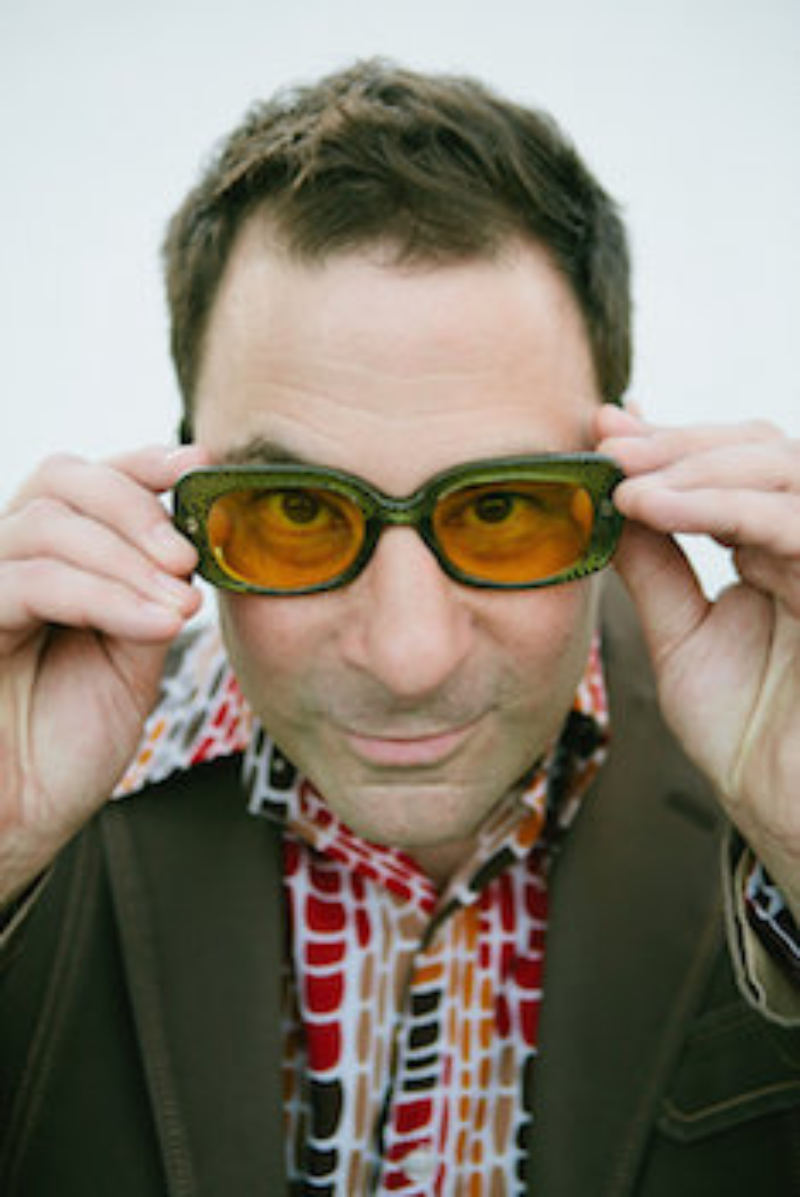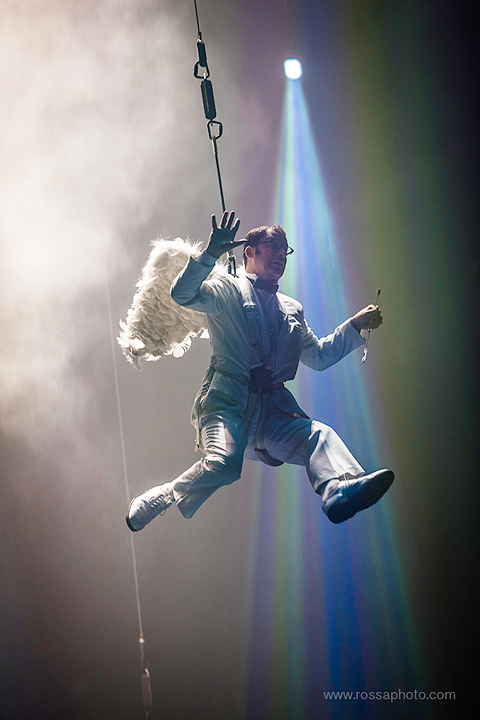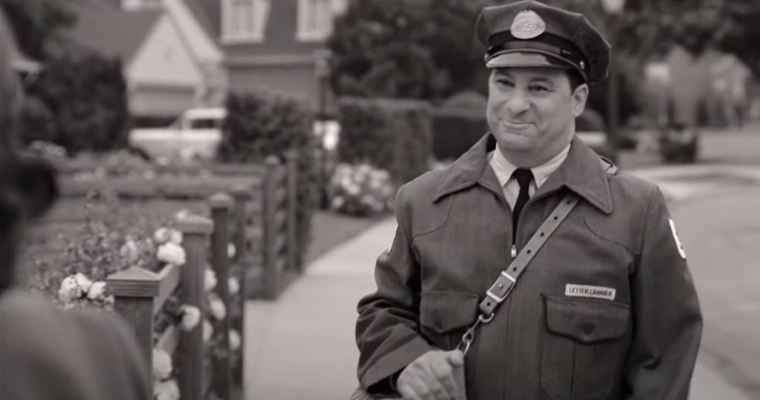Friendly Neighborhood Delivery-Man: How actor Amos Glick went from a kid performing skits at summer camp to a fan favorite on Marvel Studios’ most popular TV show
Interview with WandaVision's Amos Glick
Written by Teen Editor Triona Suiter and edited by TeenTix Teaching Artist Gabrielle Kazuko Nomura Gainor

[Interview has been edited for clarity and length]
On January 15, 2021 the first episode of Marvel’s WandaVision was released on Disney Plus. Throughout the following weeks, it quickly became one of the most popular television shows in the world, with over six million views in the United States after just the first two episodes. The unconventional lack of stylistic consistency drew viewers in, and fans immediately latched on to the mystery surrounding the unacknowledged changes in time period and design. Wild theories abounded. And, for no immediately obvious reason, many of those theories were centered around one character: Dennis the Mailman, played by Amos Glick. Was Dennis the unknown Westview resident under Witness Protection? Was he working to take down Wanda alongside Agatha? Could he possibly be the elusive Mephisto?
Over the eight weeks that WandaVision aired, hardcore Marvel fans sat down each Friday to analyze every tiny detail of the new episode. But for Amos Glick, the actor behind the Mailman, the journey started more than four decades earlier.
It’s a warm July evening in Plymouth, Vermont. The year is 1978. Several dozen young boys sit around a fire at Timberlake summer camp, taking turns performing improvised skits in small groups. A ten-year-old boy takes the stage. He’s never performed in front of people, excluding the occasional mandatory class play in school. But he’s not thinking about that. He’s having fun, laughing and joking with his friends, and he steps out in front of the group and spends a few minutes doing an impression of Julia Child.
For those lucky enough to bear witness to this event, the hilarity of the performance certainly made it one to remember.
When I spoke with Amos, he told this story with fond amusement. “I don’t know where I got the guts to do this,” Glick recalls, “I just felt comfortable. And it was like, for days, people were congratulating me on that performance.”
Triona Suiter: So when did you decide that you were going to really commit to actually pursuing [acting] as a career?
Amos Glick: In college. I remember asking my professor, “Do you think I’m good enough to go for it?” And of course he was like, “I don’t know.” He was casting me in lead roles so he had a certain amount of trust and confidence in me. But my goal was to move to the Bay Area and get involved with some political theater that I was aware of there. And to start a band. I was kind of going to equally pursue both avenues. And I pursued both of those things extensively, and then after a few years, I made the decision that I minded getting rejected from an audition less than having my music rejected. It hurt more, when it was something I had written myself. It also seemed like I was slightly more likely to actually make enough money to earn a living in acting. So I went all in.
TS: What were some of your biggest roadblocks or challenges? What kept you from just giving up and how did you push through that?
AG: I’d say the biggest challenge was financial. It’s really hard to get your head around how to do the business part of theater—or the business part of any art form. Unless maybe if you’re doing digital art such as on TikTok, where marketing is built into the platform. But how do you do that in the days before the internet? When you can barely afford to get headshots and you’re supposed to get new headshots all the time, and that’s your main way of publicizing yourself or promoting yourself? It’s just an incessant uphill struggle to figure it out, and it all costs money. So that and, you know, terrible, soul-crushing insecurity about your ability to do anything and to take your career further, creatively and business-wise. And there were several times where I was gonna quit. And right when those things would happen, something would come up and I’d go, “Okay, this sounds fun, or interesting, or challenging. I’ll do this.” And then I would get reinvigorated and just spurred on to the next phase of my creative life.
As a young man just out of college, Glick moved to the Bay Area and interned with the San Francisco Mime Troupe, a group that primarily does political musical theater for free in parks around the city. He also briefly returned to Vermont for an internship with Bread and Puppet Theater, but ultimately decided that California was where he wanted to be and joined the Mime Troupe full time. For the first few years he split his time between acting and his band A Rare Thing. As time went on he shifted his focus more towards acting, both theatrically and on camera. Starting out with commercials and corporate films, Glick’s film career eventually led him to the 1998 movie Around the Fire.
In 2007 Glick moved again to Las Vegas to work as a clown in Le Rêve, an aquatic cirque show first created by Franco Dragone. While working at the circus Glick also found time to teach improv workshops, release a CD (A Little Bit Sane, available now on www.pondermusic.com), and even host a variety show.

TS: You were in Le Rêve for nine years; what was it like to perform the same show over and over again thousands of times? How do you keep that energy alive for a decade?
AG: Yeah, it's tough. And there's an element in a job like that where everybody on the whole staff is always a little bit afraid of losing their job. Because it's such a corporate environment. So at any given moment, based on the mood of the owner of the show, you could all of a sudden feel like, “uh oh, they don’t need the clowns anymore.” Even the people who were in charge of the show’s artistic integrity were afraid of losing their jobs, if they were perceived as not doing enough to keep the show fresh. So you’re constantly getting notes like, “It looked like you were phasing out of reality there for five seconds,” and they would say, “go watch the video, you can see that you’re sitting there going *leans chin on fist,*” bored because you’ve been doing the same show a million times. And so if that happened, you were being reminded. But as a professional, you care about it. I know I did.
So I tried to find strategies that worked for me. And the best thing I found is something called Viewpoints. It’s sort of a pedagogy for creating and workshopping work, mostly in the dance world, but it’s being used more and more in theater. And one of the things they explore is kinesthetic response, which is just an immediate, full-on response by your whole person to anything that’s going on in your environment. So I trained myself to just really be open to anything that was happening on stage.
In 2016, after nine years with Le Rêve, Glick moved back to California. Having gone a decade doing no work on screen, he had no current demo reels. So before he moved he began a project that initially was intended to be a short example of him acting on camera. By the time it was complete, it had morphed into the award-winning short film A Man Wakes Up.
Written by, produced by, and starring Amos Glick, A Man Wakes Up is a hilarious and touching story that seems to effortlessly balance the utterly absurd with the breathtakingly human, all in just fourteen minutes. The film has no dialogue, a creative constraint that Glick placed upon himself at the start of the project primarily so that he didn’t have to deal with producing quality audio along with video. The final product, however, does end up having sound; things like the clink of a cereal bowl and the rustle of bedsheets help to place viewers firmly in the scene, and though the characters speak no words, there is plenty of startled shouting.
(A Man Wakes Up can be viewed for $5.)
As a working actor with a diverse skill set, Glick has spent his life on a wide variety of incredible art. But this year his work was launched farther into the public eye than ever before, by way of none other than Marvel’s own friendly neighborhood delivery guy: Dennis the Mailman.

TS: So with WandaVision, going in, how much did you know? Like when you were auditioning, what did you know about the show?
AG: Zero. It was an untitled Marvel thing. I was even unclear if it was a movie or a TV show at first. I knew it was associated with Disney because the materials you get say that. And the production company was called Big Red, alluding to the Scarlet Witch, I’m assuming. So I frantically started looking—because I knew Disney was involved, I just put in “Disney” and “big red.” And I came up with the fact that Big Red was a movie about a dog in the 70’s. But I knew Marvel was involved, so that couldn’t be it. Then finally, it became a little bit more clear what it was. But I don't even think I found out the name of the show until after I was on set.
When I first showed up for costume fitting day, the guy at the door didn’t have my name on the list. And I asked, “Oh, really?” And he goes, “You’re an extra, right?” And I go, “Uh, I think I’m a principal. I mean, I read to be a principal and they hired me to be the delivery guy.” He’s like, “Yeah, we’re only seeing extras today.” So for half an hour while I’m waiting I’m thinking, “Crap, they downgraded me to an extra.” I thought I had been demoted. And nobody knew anything ever. I got in and I was having my fitting and they started bringing in all these costumes of mail people from different decades. And I asked the costume person, “What the hell is going on here? Can you please tell me? I thought I was only working for one day on this thing, can you tell me anything about my character?” And they’re like, “We don’t know anything. We were just told to get this, that, and this.” No one knew anything. I get to set, I’m in makeup, as far as I know I’m there for one day, I’m gonna be a delivery guy or a mailman. I’m not even sure if it’s a delivery guy or a mailman, they kept saying the words interchangeably. And then the second day the director goes, “Amos! Got your lines ready?” And I’m like, “What lines?!”
TS: While the show was coming out, Dennis the Mailman was a central player in speculation and fan theories. What was that like, having the world latch on to your character?
AG: I loved it. I know my actor ego would have liked it to be something more revealing of the full breadth of my talents. Some character stuff that I could really chomp my teeth into. I had all this attention and all I did was wave. And then people thought I was Mephisto because of the way I waved. In one episode, Monica comes over to Wanda's house and they have a little bit of a fight sequence, and I'm witnessing it. Then it stops. And I just kind of shrug and keep walking. The way that I did that was so scrutinized: What does it mean that my character didn't see it with glazed over eyes, that he had a reaction to it? What was the significance of the way that he reacted? And then what was on my uniform was scrutinized too, like the little rabbit on my hat and the presto on my chest. The speculation was unending. So it was great. It was fun. And it was funny. But there was part of me that was like, “Oh, darn, I just wish that I had something more.” That when the light was focused on me in that way, it really could be a springboard for something else.
TS: So you were filming this during COVID, right? Everything was still really shut down. What was that like?
AG: It was crazy. On the one hand, I felt very safe. I had been a little bit nervous. But they were so intense about it that you just felt like you were protected. Lots of testing. And you have to fill out this questionnaire and take your own temperature and it gives you either a red or a green dot that you show the guy at the door. And then you go in and they take your temperature again, and if it’s your test day they swab you. And of course everyone’s wearing masks. Actually, this is kind of a funny story. We're rehearsing in masks. And then they go, “Okay, picture’s up, masks off.” This is the second day, and we’re shooting the scene where I have my line with Agnes. And I knew Elizabeth Olsen was the woman playing Wanda, but I didn't know who any of these other people were. It wasn’t like they’d given us a contact sheet. So I just didn't know what the hell was going on. And we all took our masks off. And then I saw that it was Kathryn Hahn. And I was like, “Oh my God! I just rehearsed with Kathryn Hahn, and I didn't even realize it!” I'm a really big fan of hers. I think she's amazing. And then boom, here I am, about to do a scene with her and even though I’d rehearsed, I didn't rehearse it knowing that it was her! So it was weird and very cool.
In the end, to the disappointment of many, Dennis the Mailman turned out to be just that: A mailman. No evil plot. No secret powers. No big reveal. Just another person, doing an important job that often is overlooked. And as it happens, that’s what the majority of performing artists are. Few of us, if any, will ever get to be a Chris. But with enough time and dedication, just maybe, we could have a chance to be an Amos.
TS: So if you could go back and tell your younger self one thing, what would it be?
AG: I guess trust yourself. Trust yourself and listen to yourself about the ideas you have. Don’t just sit back and go, “Oh, well, I can’t do that here, I guess it’s not going to happen.” There was gonna be a certain amount of procrastination in my artistic life anyway, and a certain amount of laziness. But it's more an attitude I'm talking about, where you just don't give up as easily. There's no rules about anything. Let's go back to the example of me making my short film. The idea was to shoot a demo of me acting as a guy who's 10 years older than I was the last time I was on camera. That's all I wanted to accomplish at first. Then I get this idea to do a movie. If I had been younger, I might have gone, “That's too hard. How am I going to do this?” But I trusted myself and listened to myself, and I knew this was a great idea. Who knows if I would have been able to do that back then? So I would tell myself to just be a little more bold, in my own intuition.
Lead photo credit: Corey Fox, courtesy of Amos Glick
This review was written as part of mentorship program where members of the Teen Editorial Staff receive one-on-one mentorship by Press Corps Teaching Artists and professional critics. The Teen Editorial Staff is made up of 6 teens who lead the TeenTix Newsroom and curate the review portion of the TeenTix blog. More information about the Teen Editorial Staff can be found HERE.
The TeenTix Press Corps promotes critical thinking, communication, and information literacy through criticism and journalism practice for teens. For more information about the Press Corps program see HERE.


